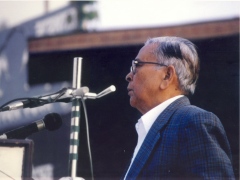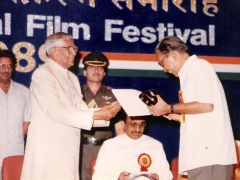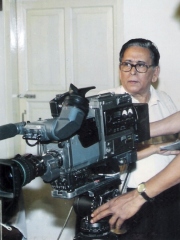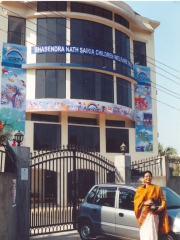Dr. Bhabendra Nath Saikia was born on February 20, 1932 in Nagaon Town in central Assam . He passed matriculation examination in 1948, securing star marks. He secured his B.Sc. Degree with honours in Physics from Cotton College in 1952 and M.Sc. in Physics from Presidency College of Calcutta University in 1955 – 1956. He obtained Ph.D. Degree in Physics in 1961 from London University . He also obtained Diploma of Imperial College (DIC) of Science & Technology, London in 1961.

Dr. Saikia started his illustrious career as a physics teacher, first at the Sibsagar College and then at the Gauhati University . He did pioneering work in the publication of college level textbooks in the Assamese language during his tenure as Secretary of the Co-ordination Committee for production of textbooks in regional languages. He served as the Chairman of the Railway Service Commission, North East Frontier Railways in the early eighties. However, it was his literary genius that made Dr. Saikia a household name in Assam . Be it short stories, novels, stage plays or children’s literature –Dr. Saikia’s stature in Assamese literature is unparalled. He is the author of twenty nine books as of January, 2001 which also includes his autobiography Jivan Britta that he completed in 2000.

He received the Sahitya Academy (India) Award in 1976, the Publication Board, Assam, Award in 1973 (Inaugural Year) and the Sahityik Hara Nath Ghosh Madel for 1981 given by the Bangiya Sahitya Parishad, Calcutta, the Assam Valley Literary Award of 1990 (Inaugural Year) instituted by the Magor Education Trust and the Surendra Nath Paul Award for lifetime achievement, awarded by the cha – cha – cha Tea Festival of Calcutta in 1999.
He was honoured with the Srimanta Sankardeva Award, the highest award Instituted by the Government of Assam, for the year 1998, and the Kamal Kumari National Award for the year 2000. In 2001, the Dibrugarh University conferred the Degree of D.Litt, honoris Causa on Dr. Saikia in recognition of his outstanding contribution in the fields of cinema and literature. He was awarded Padma Shri by the Government of India in the same year.
He broke new grounds in the field of journalism in the state while serving as Editor of the children’s magazine Sofura and the Chief Editor of the prestigious fortnightly Magazine Prantik. As an editor of Sofura, Dr. Saikia was intensely involved with cultural growth and development of children.

Dr. Saikia was an icon in the field of Assamese Cinema. His contribution was instrumental in carrying Assamese Films forward into the global arena. The seven Assamese feature films that Dr. Saikia directed were all awarded the prestigious Rajat Kamal award as the best regional films. They are Sandhya Raag (1977), Anirban (1981), Agnisnaan (1985), Kolahal (1988), Sarothi (1992), Abartan (1994) and ltihaas (1996). Besides that, he won the national award for the best screenplay for one of his films Agnisnaan. His films have been included in the Indian Panorama section of the Indian Film Festival and have been screened at many international film festivals such as Cannes , Montreal , Toronto , Karlovy Vary , Nantes , etc.
He was adjudged as one of the “Twenty-one Great Assamese Persons of the twentieth century”. He was instrumental in the conception and development of the Sri Sankardeva Kalakhsetra, Assam and served as its Vice Chairman until August, 2003.
Dr. Saikia was a Member, Sangeet Natak Akademi; Member of the Executive and General Council of Sahitya Akademi; Member, Indian National Council for co-operation with UNESCO; Member, Academic Council, Gauhati University; President of Jyoti Chitraban (Film Studio) Society; Member, Advisory Body, AIR, Guwahati; Chairman, Assam State Film (Finance and Development) Corporation Ltd; Member., Governing Body, North East Zone Cultural Centre, Dimapur; Member, Governing Body, East Zone Cultural Centre, Kolkata; Member of Court of the Gauhati University, Assam; Member, Society of the Film and Television Institute of India, Pune, Member, Board of Trustees, National Book Trust of India.
It was not the awards and accolades that give Dr. Saikia the stature he enjoys in Assamese society today. An intensely private person, he led a life of simplicity, honesty and hard work with unwavering principles and standards that earned him universal respect. He managed his public life and duties while staying grounded and devoted to the well-being of others.
Even as he was steered to a career path of the sciences as was the norm in those days, Dr Saikia pursued his love for the arts and cinema with determination from a tender age. He firmly believed that true education and enrichment comes from knowledge of and exposure to the arts and culture. He felt that the existing education system did not provide this essential exposure to children and created a tangible void in their development – the result is Aarohan, his personal endeavour to bring to underprivileged children a world of music, dance, art and theater that would enrich and complete their lives.

Dr. Saikia passed away on August 13, 2003 before Aarohan could be completely built. Dr. Saikia's wife Preeti Saikia and his daughter Sangeeta Saikia, with the help of his wellwishers carried on the work of his dream project and Aarohan opened its doors to the children of the community on May, 2005. Preeti Saikia, with a group of dedicated Trustees, teachers and staff have implemented exemplary programs at Aarohan and to date have educated thousands of children. Today, as one steps into the hallways of Aarohan, to the sound of young voices singing, the reverberation of ghungroos and the beat of the tabla, as one walks past children in art and chess classes, one bears witness to one man’s dream fulfilled with love and commitment by those who revered him.